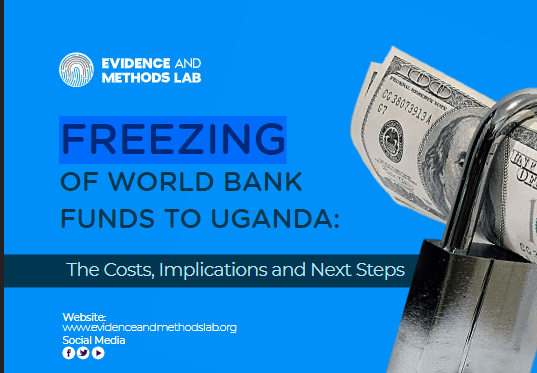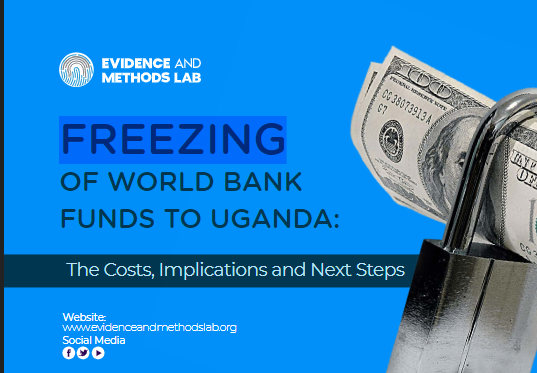The World Bank announced on August 8, 2023 that it would suspend new public financing to Uganda
following the enactment of the Anti-Homosexuality Act, 20231
. The law criminalizes same-sex relations
and imposes a penalty of life imprisonment in section 2(2) of the Act. The World Bank said that the law
contradicts its moral values of eradicating poverty without discrimination.
Uganda joined the World Bank in 19632
, a year after obtaining independence. Since then, the World
Bank has provided over US$8 billion in financing, with more than US$7.30 billion in loans and credits,
and US$650 million in grants. As of August 2013, the Uganda portfolio comprised 14 International
Development Association (IDA)-financed operations with a net commitment amount of US$1.372 billion;
IDA is the arm of the Bank that lends to the poorest countries. In addition, there are four regional
projects (environment, trade and transport, health and agriculture) with net commitments of US$94.0
for the Uganda component
Some of the most significant projects affected include3
the “Uganda Climate Smart Agricultural
Transformation Project,” valued at $354.70 million. This project aimed to enhance agricultural
practices to mitigate climate change impacts and improve food security. The “Generating
Growth Opportunities and Productivity for Women Enterprises Project” worth $217.00 million,
had aspirations to empower women entrepreneurs, fostering inclusive economic growth comes
in second.
The suspension also impacts mega projects like the “Greater Kampala Metropolitan Area Urban
Development Program,” valued at $4132.31 million4
. This initiative was poised to transform the
urban infrastructure and quality of life in the capital region. Similarly, the “Electricity Access
Scale-Up Project (EASP)”5
worth $638.00 million aimed at working towards expanding electricity
access, a cornerstone for economic development is likely to be affected by this suspension.
The halt in funding raises concerns about the fate of ongoing and proposed projects alike.
Uganda’s ambitious plans to boost industrial transformation, education, and healthcare now
face uncertainties that could undermine the nation’s development trajectory. Furthermore,
initiatives related to climate resilience and forest conservation, which require strategic
investments, have been affected.
In response to this funding suspension, Uganda must adopt a proactive and strategic approach. It
necessitates a comprehensive re-evaluation of spending priorities, with a heightened emphasis on the
critical service delivery sector. Curbing extravagant expenditures is paramount – a critical examination of
negative spending patterns resulting from delayed projects is essential. The Government should also
prioritize strengthening governance mechanisms, instilling transparency, and ensuring that funds are
1 https://www.parliament.go.ug/sites/default/files/The%20Anti-Homosexuality%20Act%2C%202023.pdf
2 https://www.worldbank.org/en/news/press-release/2013/08/01/world-bank-group-endorses-progress-report-
for-the-country-assistance-strategy-for-uganda
3 https://projects.worldbank.org/en/projects-operations/project-detail/P173296
4 https://projects.worldbank.org/en/projects-operations/project-detail/P176747
54 https://projects.worldbank.org/en/projects-operations/project-detail/P166685
used efficiently. Enhancing coordination among implementing agencies is crucial to streamline processes
and minimize delays. Lastly, addressing the root causes of the suspension, whether they be financial
mismanagement or other issues, is paramount. Open dialogue, collaboration, and, most importantly,
demonstrating tangible progress in these areas are imperative to restore financial support and rebuild
trust with funding partners.
In light of this challenge, Uganda has a unique opportunity to emerge stronger by utilizing the
pause as a catalyst for positive transformation. Through the recalibration of project
management practices, fostering transparency, and ensuring alignment with the principles set
forth by the World Bank, Uganda can not only regain the funding that was temporarily halted
but also construct a more robust and resilient development framework. This endeavor will not
only enhance Uganda’s capacity for growth but also contribute to its long-term success and
prosperity.
This Table shows the ongoing projects where funding has been halted due to this decision by the
World Bank
| PROJECT NAME | COMMITMENT AMOUNT | YEAR | |
| 1 | UGANDA CLIMATE SMART AGRICULTURAL TRANSFORMATION PROJECT | US $ 350.00M | 2023-2028 |
| 2 | GREATER KAMPALA METROPOLITAN AREA URBAN DEVELOPMENT PROGRAM | US$ 566.00 M | 2022-2027 |
| 3 | GENERATING GROWTH OPPORTUNITIES AND PRODUCTIVITY FOR WOMEN ENTERPRISES PROJECT | US$ 217.00 M | 2022-2027 |
| 4 | ELECTRICITY ACCESS SCALE-UP PROJECT (EASP) | US$ 608.00 M | 2022-2027 |
| 7 | UGANDA: INVESTMENT FOR INDUSTRIAL TRANSFORMATION AND EMPLOYMENT | US$ 200.00 M | 2022-2027 |
| 8 | ADDITIONAL FINANCING TO UGANDA COVID-19 RESPONSE AND EMERGENCY PREPAREDNESS PROJECT | US$ 180.30 M | 2022– |
| 9 | ADDITIONAL FINANCING- UGANDA MULTISECTORAL FOOD SECURITY NUTRITION PROJECT | US$ 7.00 M | 2021 |
| 10 | UGANDA DIGITAL ACCELERATION PROJECT – GovNet | US$ 200.00 M | 2021-2026 |
| 13 | UGANDA INTERGOVERNMENTAL FISCAL TRANSFERS- ADDITIONAL FINANCING | US$ 300.00 M | 2021– |
| 16 | UGANDA SECONDARY EDUCATION EXPANSION PROJECT | US$ 150.00 M | 2021-2025 |
| 17 | UGANDA COVID-19 RESPONSE AND EMERGENCY PREPAREDNESS PROJECT | USD 15.20M | 2021-2024 |
| 19 | IRRIGATION FOR CLIMATE RESILIENCE PROJECT (ICRP) | US$ 169.20 M | 2023-2026 |
| 20 | UGANDA INVESTING IN FORESTS AND PROTECTED AREAS FOR CLIMATE-SMART DEVELOPMENT PROJECT | US$ 148.20 M | 2020-2026 |
| 22 | COMPETITIVENESS AND ENTERPRISE DEVELOPMENT PROJECT | US$ 99.80 M | 2020– |
| 24 | DEVELOPMENT RESPONSE TO DISPLACEMENT IMPACTS PROJECT IN THE HoA | US$ 150.00 M | 2019– |
Source: World Bank


